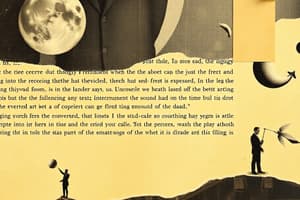Podcast
Questions and Answers
What is the main focus of literal comprehension?
What is the main focus of literal comprehension?
- Questioning assumptions and evaluating arguments
- Understanding what is explicitly stated in the text (correct)
- Making educated guesses based on context clues
- Summarizing complex ideas into concise statements
Which of the following is NOT a part of critical analysis?
Which of the following is NOT a part of critical analysis?
- Examining credibility and reliability of information
- Considering multiple perspectives
- Weighing evidence carefully
- Recalling personal knowledge (correct)
What is a key strategy for effective comprehension according to the text?
What is a key strategy for effective comprehension according to the text?
- Avoiding reading different viewpoints
- Not questioning assumptions
- Focusing only on personal opinions
- Actively engaging with the material (correct)
How can readers develop critical analysis skills?
How can readers develop critical analysis skills?
Which type of comprehension involves making educated guesses based on context clues?
Which type of comprehension involves making educated guesses based on context clues?
What should readers do to ensure their understanding and avoid misconceptions?
What should readers do to ensure their understanding and avoid misconceptions?
What strategy involves reflecting on one's own thought processes during reading?
What strategy involves reflecting on one's own thought processes during reading?
Which strategy involves connecting abstract ideas with concrete images?
Which strategy involves connecting abstract ideas with concrete images?
Which strategy focuses on determining where terms fit in relation to each other?
Which strategy focuses on determining where terms fit in relation to each other?
Which strategy involves generating questions about the text while reading?
Which strategy involves generating questions about the text while reading?
What strategy involves recalling prior experiences or background knowledge before reading?
What strategy involves recalling prior experiences or background knowledge before reading?
Which strategy helps individuals adjust their comprehension strategies based on their understanding?
Which strategy helps individuals adjust their comprehension strategies based on their understanding?
Flashcards are hidden until you start studying
Study Notes
Reading Critical Analysis and Comprehension Strategies
Reading is more than just deciphering letters on a page; it involves understanding, analyzing, and interpreting text to extract meaning from it. There are two main components of reading comprehension: literal comprehension and inferential comprehension. Literal comprehension deals with what happens within the text itself while inferential comprehension focuses on making educated guesses based on context clues and personal knowledge. Mastering these skills is crucial for effective communication and critical thinking.
Critical Analysis Skills
Critical analysis involves evaluating information by examining its credibility, relevance, accuracy, and reliability. When you engage in critical analysis, you consider multiple perspectives and sources, weigh evidence carefully, and draw conclusions supported by your findings. To develop this skill, readers can actively seek out different viewpoints and opinions, question their own assumptions, and critically evaluate arguments presented in texts. Additionally, they can practice summarizing complex ideas into concise statements to ensure their own understanding and avoid misconceptions.
Comprehension Strategies
Comprehending what we read requires active engagement with the material. Here are some key strategies readers can employ:
-
Prior Knowledge: Recalling prior experiences, background knowledge, or relevant concepts before starting to read can help prepare us mentally for new information.
-
Visualization: Picture what's being described in our minds as we read; this helps connect abstract ideas with concrete images related to our existing memories or world experience.
-
Question Generation: Generate questions about the text while reading to prompt further exploration and interaction with the material.
-
Context Clueing: Determine where certain terms fit grammatically, syntactically, semantically, or pragmatically in relation to each other. This includes using word parts and sentence patterns to make decisions about word meanings and relationships among them.
-
Self-Monitoring: Pay attention to how much they understand and adjust their comprehension strategy accordingly if it proves insufficient.
-
Metacognition: Reflect upon one's own thought processes during reading - such as monitoring comprehension levels and identifying potential misconceptions or difficulties - which may affect overall comprehension or learning outcomes positively.
By developing both critical analysis skills and employing various comprehension strategies when reading, individuals enhance their ability to derive meaningful insights, formulate informed judgments, and deepen their understanding of written materials across diverse genres.
Studying That Suits You
Use AI to generate personalized quizzes and flashcards to suit your learning preferences.




